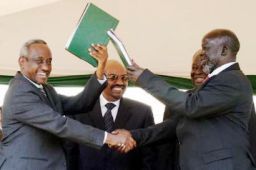Ruling party fails to undertake promised reforms in South Sudan – HRW
Mar 8, 2006 (NEW YORK) — More than a year after the Sudanese government and former rebel SPLM/A signed the peace agreement that ended their 21-year war, Sudan’s ruling party has failed to undertake promised reforms that would help end human rights abuses throughout the country, Human Rights Watch said in a briefing paper released today.
 Sudan’s central government and the southern-based Sudan People’s Liberation Movement/Army (SPLM/A), signed the Comprehensive Peace Agreement in January 2005. The accord ended a brutal war that was waged mostly in Southern Sudan. In September, the Government of National Unity was sworn in, giving the SPLM a share in power and wealth distribution at the national level in Sudan.
Sudan’s central government and the southern-based Sudan People’s Liberation Movement/Army (SPLM/A), signed the Comprehensive Peace Agreement in January 2005. The accord ended a brutal war that was waged mostly in Southern Sudan. In September, the Government of National Unity was sworn in, giving the SPLM a share in power and wealth distribution at the national level in Sudan.
The Comprehensive Peace Agreement transformed a single-party state – ruled by the National Congress Party (NCP) since 1989 – into a coalition government. But the NCP has retained majority control, which it uses to delay democratization and reform.
“Sudan’s ruling party has shunted aside fundamental reforms required by the peace agreement,” said Jemera Rone, Sudan researcher for Human Rights Watch. “Khartoum has failed to reform the security agencies and the law on political parties. Promises to open up the political arena have not been kept.”
Under the peace agreement, the SPLM also has the right to form a southern regional government – and the south has the right to a self-determination referendum in 2011.
The south’s new regional government faces several difficult post-war challenges, however. Southern Sudan is receiving much less oil revenue than anticipated. The wealth-sharing agreement stipulates that the south should share in revenue from oil produced there. But the precise border between north and south remains unresolved, and there is a lack of transparency on oil revenues.
“The Southern Sudan government budget depends on its share of oil revenue,” Rone said. “With limited resources, the southern regional government cannot pay for a new judicial system or police department, nor can it implement plans to improve social services and build infrastructure.”
While the southern government has been able to strike compromises with some formerly NCP-backed ethnic southern militias that fought the SPLA in the past, the NCP has not ended its support of other southern ethnic militias – which is part of its long-range counterinsurgency strategy. Upper Nile state, a key location for current oil development, is under the control of an important southern militia and an NCP governor, and it is still plagued by instability.
Even more troublesome is the persistent presence and activity of the Lord’s Resistance Army in and around the Southern Sudan capital of Juba. This northern Uganda rebel group continues to destabilize the region around Juba, ambushing and mining the roads between Juba and the Ugandan border and attacking and looting southern Sudanese civilians. The Uganda rebels likely continue to receive unofficial support from NCP military and security elements around Juba. Under the peace agreement, these NCP forces do not have to withdraw from Juba until mid-2007.
Women’s rights pose an enormous human rights challenge in the south. So far, neither the constitutional and legislative provisions of the National Unity government nor the southern regional government have overcome the legacy of customary law and traditions that limit women’s rights.
“Only full and immediate compliance with the Comprehensive Peace Agreement will pave the way to the democratic transition that Sudan should be making,” said Rone.
The Human Rights Watch briefing paper, “The Impact of the Comprehensive Peace Agreement and the New Government of National Unity on Southern Sudan,” is available at:
http://hrw.org/backgrounder/africa/sudan0306/index.htm
(HRW/ST)
